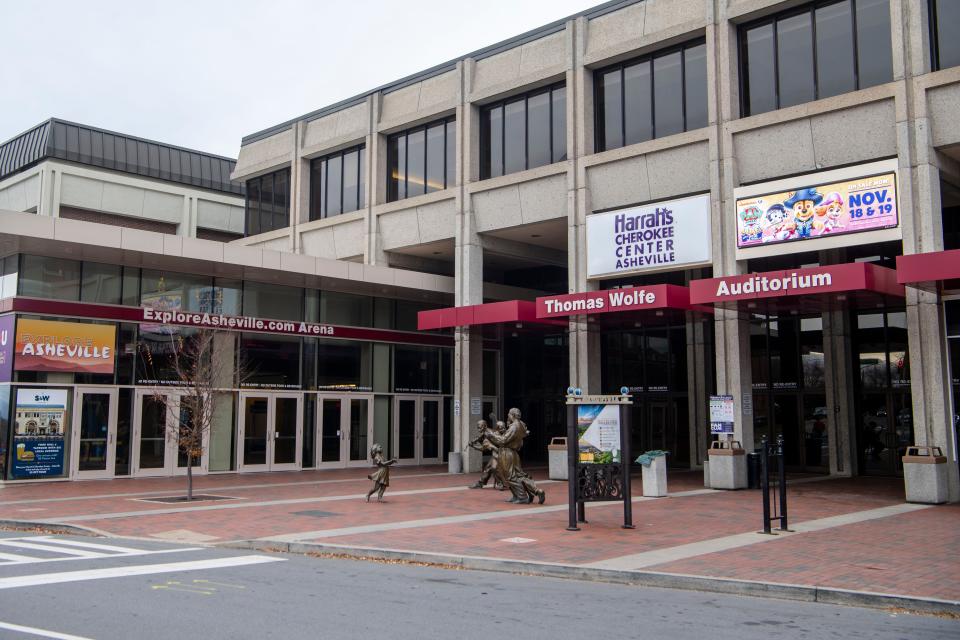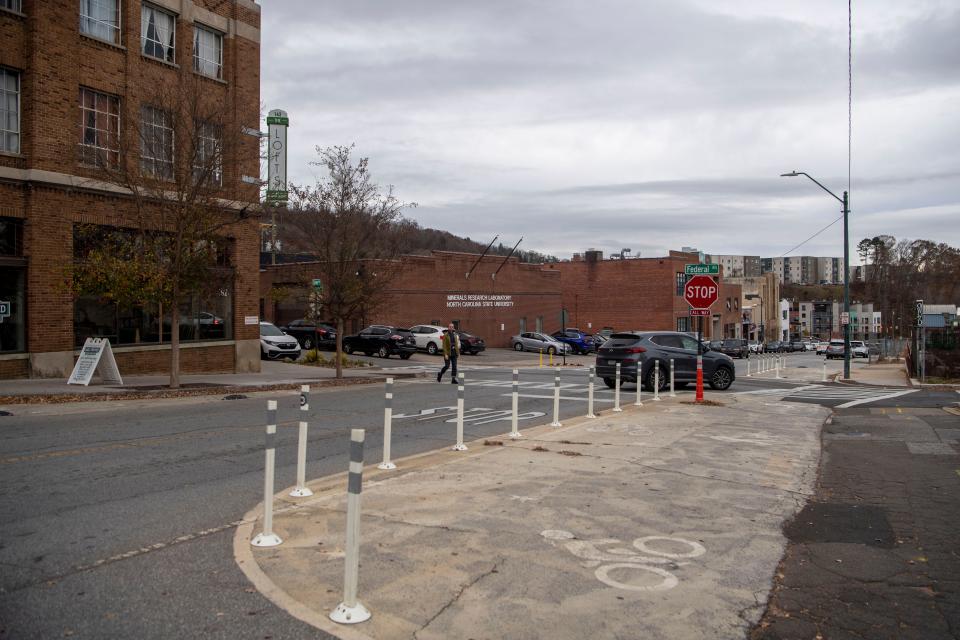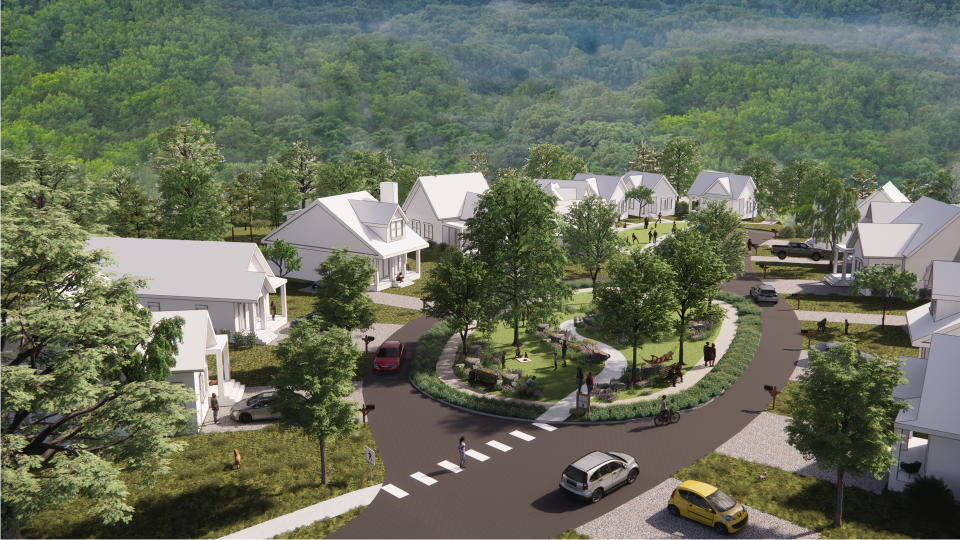Asheville, Buncombe to make 1st asks of new TDA fund. Is affordable housing on the table?
ASHEVILLE - Improvements of a core downtown Asheville street. Needed repairs in the aging Thomas Wolfe Auditorium. A new greenway. And possibly, for the first time, affordable housing.
These are among the asks from the Buncombe County Tourism Development Authority's newest pool of funding. An estimated $10 million is up for grabs as part of the Legacy Investment From Tourism fund, or LIFT, derived from one-third of the lodging tax paid by visitors who stay overnight in Buncombe County in facilities including hotels, vacation rentals and bed-and-breakfasts.
This is the first round of LIFT funding since legislative changes created the fund and increased the amount that can be used for community capital projects from one-quarter to one-third.

Before the local bill's passage, the county's hotel and other room occupancy tax dollars, which go to the Buncombe County Tourism Development Authority, were split 75%-25% between marketing and projects. Now more money is dedicated to projects that will keep visitors in the Asheville area longer, and less to advertising.
Since 2001, this money was doled out only through the Tourism Product Development Fund, focused on major tourism projects that bring visitors to the city. Now it's divided between both funds.
The LIFT fund broadens the scope of potential projects. According to a Nov. 14 presentation by the city, it includes projects that:
Increase patronage of lodging facilities, meeting facilities, and convention facilities by attracting tourists, business travelers.
Benefit the community at large in Buncombe County.
This includes restoration or rehab of existing locations, maintenance and design of tourism-related capital projects, enhancement of natural resources, expansion of necessary infrastructure and construction of a new location, entirely, according to a TDA guide.

Many have interpreted this to encompass affordable housing. But it's uncharted territory.
TDA spokesperson Ashley Greenstein wouldn't get specific, either.
"The LIFT Fund Committee will carefully review all submissions in this competitive grant process, providing recommendations to the BCTDA based on each project’s merit and adherence to program guidelines," she said in an emailed statement Nov. 16. "We look forward to seeing what is submitted by nonprofit and government partners. It is too early for anyone to say what will or won’t be considered."
Mayor Esther Manheimer said she's interested to see how the TDA deals with its "first affordable housing application," which is likely coming from the county. The legislation itself does not name affordable housing, she said, and it comes down to the interpretation of the statute.
"We're really hopeful," she said at the Nov. 14 meeting. "But that's not a done deal."
What's the county's ask?
Though it hasn't been officially discussed by the Buncombe County Commission, Chair Brownie Newman said they anticipate only one ask of the TDA: $6 million for the county's Ferry Road project, a 645-unit, 54% affordable development on county owned land.
Newman anticipates a formal discussion at an upcoming commission meeting.
The development would be one of the largest affordable and workforce housing development ever built in Buncombe County, Newman said. Along with housing, it would include nearly 2 miles of greenways, a community green and five “pocket parks,” and 72 acres of conserved land, which covers roughly 60% of the property.

The project will require more than $30 million of public investment, and while the county is prepared to take the lead, "this is an opportunity to for the TDA to be a really strong partner in a major project that would have these great public benefits for the community."
"This would be a new use of the funds," he confirmed. The county has been in talks with the TDA about the possibility and said feedback from the board has been divided, with some strongly supportive and others "a bit more undecided."
The county wouldn't be submitting the ask if it didn't think it was a possibility.
"We’re not just doing it to make a point. We really want them to fund this project,” Newman said. "We absolutely believe it is a permissible use of these public tax payer dollars."
A scarcity of affordable housing is among the greatest challenges to the "future vitality" of the county's tourism industry, he said.
“We believe that creating more workforce housing, affordable to service sector workers, is essential to the future success of the industry,” Newman said.
Amenities for tourists are great, he said, “but if you don’t have the workforce there to support all the different things that people come here to do, then these other kinds of projects, ultimately, will not realize their potential."
What's the city's ask?
While the city has been vocal in its support of more affordable housing, which has been named among its top strategic priorities for two consecutive years, in order to apply for LIFT funds, it would have needed a project in the pipeline.
At its Nov. 14 meeting, council members heard a presentation on the projects the city will apply for in this round of LIFT funding, with a deadline of Dec. 1:
Coxe Avenue: Partially grant funded planning, environmental and engineering work to improve the pedestrian and multimodal infrastructure along Coxe Avenue, from Patton to Short Coxe avenues. Amount: $3 million.
Thomas Wolfe Auditorium: HVAC reapair and design for auditorium. Amount: $1.8 million.
Big Belly Trash Cans: A trial in key areas with 10 Big Belly units, solar powered trash-compacting bins. Amount: $30,000.
Aston Tennis Center: Design for a rebuild of six tennis courts. Amount: $15,000.
Nasty Branch Greenway: Urban greenway linking the southern River Arts District/Livingston Street neighborhood to the South French Broad neighborhood. The greenway will include two retaining walls, benches, approximately 4,000 linear feet of 10-foot asphalt greenway, entry treatments and historical markers. Amount: $1 million.
Possible upcoming applications in future rounds of funding included Interstate 26 priorities, affordable housing, downtown infrastructure improvements, like sidewalks and parking garages, and greenways.
Though no vote was taken, council members largely supported a letter of support for the county's Ferry Road project, which would be included as part of its application to the TDA.

“I feel really clear that lodging tax should go to affordable housing. It has displaced so many people, so many residents, so much of the workforce that supports the actual industry," said council member Sage Turner. "I’m going to do whatever I can to see if we can get tourism dollars toward affordable housing. Period.”
With only about $10 million in this year's LIFT fund, there was some tension around supporting the county project, as a $6 million award to Ferry Road would mean some city projects would not receive funding.
Council member Sandra Kilgore worried that a formal letter supporting the county might confuse the process.
“It could mean some of our stuff is not getting funded, but I think that’s fine as long as we understand the implication and we want to support the housing ask," Manheimer said.
Timeline
Oct. 31: Phase 1 applications open.
Dec. 1: Phase 1 applications due.
Dec. 18: Phase 1 applicants notified (invite to Phase 2).
Feb. 28: Phase 2 applications due.
April 24: Funding recommendations presented to the BCTDA board.
Applicants must be a federally recognized nonprofit organization or government entity.
More: Asheville workers call on TDA to put tourism tax dollars toward affordable housing
More: Buncombe TDA estimates $8.2M for tourism capital projects; Who can apply?
Sarah Honosky is the city government reporter for the Asheville Citizen Times, part of the USA TODAY Network. News Tips? Email shonosky@citizentimes.com or message on Twitter at @slhonosky. Please support local, daily journalism with a subscription to the Citizen Times.
This article originally appeared on Asheville Citizen Times: What are Asheville, Buncombe's asks from new $10M TDA fund?

